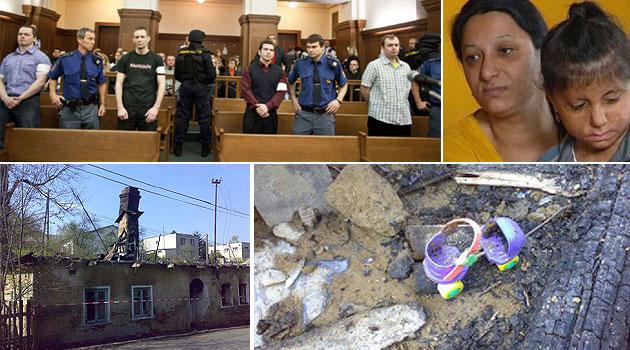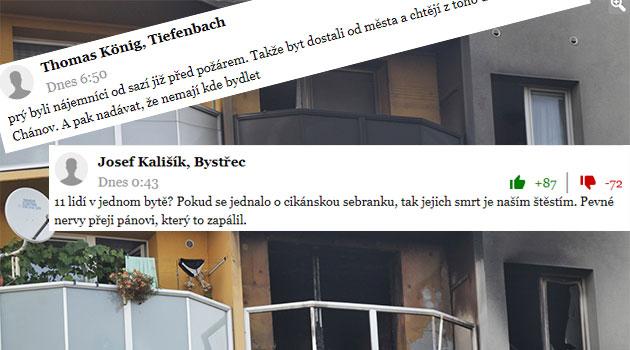Ten years on from neo-Nazi arson conviction, Czech attorney warns it could happen again

In the late night hours of 18 April 2009 and the early morning hours of 19 April, four neo-Nazis attacked a single-family home in which a Romani family was living in the town of Vítkov, Opava district. The powerful blaze they started almost cost the life of an infant who was not even two years old and injured her father and mother.
The perpetrators of the racially motivated crime were apprehended by police and the court handed down extraordinarz sentences against them on 20 October 2010. “That arson attack was absolutely exceptional in its brutality, in the destructive way it was performed, and in whom the perpetrators chose to victimize – a Romani family with several young children. Natálie Kudriková remains the youngest victim of bias violence committed on the territory of the Czech Republic and it is just coincidence that the hateful attack did not cost her her life,” said Klára Kalibová, director of the In IUSTITIA organization, who has long dedicated herself to aiding the victims of bias violence and hate violence to whom the organization provides legal and other professional services.
Speaking with news server Romea.cz., Kalibová reflected on the arson attack and its subsequent trial in association with the current situation in the Czech Republic. “That was an attack that followed a wave of demonstrations that were full of hate and prejudice, and it was the kind of attack that experts in the field of bias violence and extremism assumed would be committed. The rising wave of the hatred that had been apparent at the Janov housing estate in Litvínov during 2008 and 2009 culminated in that attack – it may have been perpetrated on the other side of the country, but it was nonetheless directly related to that growth in determination among the members of the ultra-right at that time. We can see obvious parallels with the situation today and the security quandary we saw during the recent demonstration on the Old Town Square in Prague,” the attorney told Romea.cz.
According to Kalibová, it is also interesting, from a legal standpoint, to recall the kind of effort the police, prosecutor and judges expended during the proceedings around the 2009 arson. Criminal justice authorities took all aspects of the attack into account in their sentencing, both the biased, hateful motivation of the perpetrators and the brutal, premeditated way in which the attack was performed.
“For that reason the sentences were rather long, but they were not excessive or discriminatory as some politicians did their best to label them at the time, including, for example, former President Václav Klaus,” she said. “We could only hope that the bravery and professionalism demonstrated towards the work undertaken back then by the police and the courts would be demonstrated by the criminal justice authorities in other cases as well, cases where the injured party is not a two-year-old girl, but a Romani teenager, for example, or a man from Tunisia. Hate crimes continue to be perpetrated here and we are not seeing adequate police responses to investigating them. Unfortunately, recent decisions by the criminal justice authorities rather demonstrate that the state has not yet begun to view biased hatred as something that should be focused on more intensively. What is even worse, we are on the way to seeing similar attacks being repeated in the near future.”
When we recall the Vítkov arson attack or the anniversary of its perpetrators being convicted, this warning takes on even more urgency. If one reviews the online discussions held beneath the media outputs reminding readers of these events, they are full of comments and speculations as to whether the infant injured by the attack deserved the kind of legal protection she received, or whether her parents were not in fact to blame for what happened to her.
“It is not possible to say that we ever saw the kind of society-wide solidarity with Natálie Kudriková that might have been anticipated in such a case. This is a child who suffered serious damage to her health at the age of two, something she will never fully recover from, and despite that, her suffering has been continuously doubted,” Kalibová pointed out.
House no. 58
Three masked perpetrators attacked house no. 58 on the outskirts of Vítkov just before midnight on 18 April 2009. A fourth accomplice waited for them in a car so they could flee the scene of their crime.
The men threw lit Molotov cocktails full of gasoline through the windows of the ground-floor structure. Eight people were sleeping inside the house at the time.
Natálie Kudriková suffered burns over 80 % of her body. She was taken to the hospital in critical condition and released by doctors eight months later.
She has lost three of her fingers and will live with other repercussions of the attack for the rest of her life. Her mother, Anna Siváková, and her mother’s partner, Pavel Kudrik, suffered injuries that were less serious as they fled their burning home.
Detectives were led to the perpetrators after a volunteer firefighter in the Opava area overheard a phone call between an acquaintance of his and one of the perpetrators on that fateful day. After he learned of the tragedy in Vítkov from media reports, the firefighter reported the suspicious call to police.
In mid-August 2009, the detectives working on the case arrested 12 right-wing extremists. Four were eventually accused by the prosecutor of attempted racially-motivated murder.
The trial of the suspects began in May 2019 in Ostrava. The defendants were Václav Cojocaru, Jaromír Lukeš, Ivo Müller and David Vaculík.
According to experts on extremism, all four youths were active neo-Nazis, as was evidenced by objects found during searches of their residences. Vaculík repeatedly wore Thor Steinar brand clothing into the courtroom during the trial, a brand associated with and loved by neo-Nazis.
The defendants claimed to have not known that the single-family home was occupied at the time they committed their attack. They claimed to have considered it a warehouse of stolen goods.
Those defending the neo-Nazis asked the court to assess their actions not as attempted murder, but just as reckless endangerment or the causing of personal injury. What’s more, one defense attorney indirectly accused the parents of the burn victim of co-responsibility for their child’s serious wounds, alleging that they had not removed the little girl from the burning room quickly enough.
They knew people were in the house
The verdict was handed down on 20 October 2010. “We are of the opinion that the defendants knew the house was occupied,” Judge Studnička said.
The court called the perpetrators’ actions a brutal attack, comparing it to the Kristallnacht event during which Nazis set fire to synagogues and other Jewish targets in November 1938 in Germany. The verdict said the men had not been able to afford to attend the recent neo-Nazi demonstrations and had wanted to make up for that fact by committing the attack as proof of their convictions.
Lukeš, Müller and Vaculík were all sentenced to 22 years in prison. In theri case, the fact that they had previously been convicted of violent crimes and of promoting Nazism was an aggravating circumstance.
The fourth defendant convicted, Cojocaru, received a sentence that was two years shorter. The court took into consideration the fact that he had no prior criminal record, that he had not contributed to the organization of the attack to the same degree as the other three, and that he had joined the rest at the last minute.
All of the defendants appealed the verdict. The case was next heard by the High Court in Olomouc, which reduced Müller’s sentence to 20 years in the spring of 2011.
The court took that step because Müller confessed to the crime and they said he had demonstrated remorse. The sentencing for the other three defendants was upheld by the High Court, and the Supreme Court later upheld it as well.
